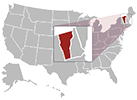
Vermont is one of the smallest states in the country, yet it has one of the highest rates of substance use in the United States.
This includes alcohol and marijuana.
People with substance-use disorders often feel isolated and hopeless.
In order to successfully recover, they need a good treatment plan and ongoing support.
One source of support could come from a recovery coach.
Becoming a professional recovery coach can be a rewarding and interesting career for the right person.
It’s really geared toward people who are themselves in recovery and have the lived experience of being in both active addiction and recovery.
As a recovery coach, it would be your job to work with clients who are new to recovery and support them.
Basically, a large part of your job is to help people find their strengths and interests, and use them to formulate goals for a sober future.
A professional recovery coach can be self-employed, or work in detox centers, treatment facilities, hospitals, or with private therapists.
If you are in recovery, and you want to share your experience, hope, strength with others, then being a recovery coach may be worth looking into.
Keep reading for some useful information on becoming a recovery coach in Vermont.
Page Navigation
Steps To Becoming A Professional Recovery Coach In Vermont
In Vermont, if you’d like to become a professional recovery coach, you will ultimately need to get an internationally recognized certificate in recovery coaching.
This credential is valid everywhere in the United States, Canada, and Mexico.
In order to become certified, you must complete these steps:
- Have your high school diploma or GED, If you don’t yet have this credential, The Friends of Recovery can help with this.
- Volunteer at a facility that works with people who have substance-use disorders.
- Fill out the application for the Vermont Recovery Academy.
- Have the supervisor at your volunteer assignment sign off on the application.
- Complete the Recovery Coach Academy.
- Take and pass the certification exam.
Schools/Centers That Offer Courses To Become A Professional Recovery Coach In Vermont
1. Vermont Recovery Coach Academy 
About The Academy
The Vermont Recovery Coach Academy is part of the larger organization called Friends of Recovery – Vermont.
Founded in 1997 to free up resources in the Vermont Department of Health, they have become the hub for everything regarding recovery in the state.
They provide resources and support for those in need, as well as oversee the creation and implementation of training for recovery professionals.
About The Course
This course is 46 hours long and requires that you have at least 1 year of continuous recovery under your belt.
The course involves role-playing, group activities, classroom theory, videos, and book study.
All supplies are included in the $900 program cost.
Topics of study include motivational interviewing and techniques, community resources, science of addiction, harm reduction, ethics and boundaries, multiple pathways to recovery, self/care, and stigma reduction.
Multiple scholarships are available for students that qualify.
Address: 100 State St.
Montpelier, Vermont 05602
Phone: (802)5361653
Website: https://recoveryvermont.org/recovery-coaching/
Recovery Coach Representative Schools in Vermont – Summary Table
Top 1 Schools in Vermont
| School Name | Address |
|---|---|
| Vermont Recovery Coach Academy | 100 State St. Montpelier, Vermont 05602, USA |
Salary For Professional Recovery Coaches In Vermont
The average salary for a professional recovery coach in Vermont is $36,599 per year.
However, many people report making more like $42,500 per year.
How much you make as a coach will vary depending on where you work, the type of facility, your experience, and your education.
The areas paying the most include Burlington and Rutland.
Annual Salary Range:Average Salary of Professional Recovery Coachs in Vermont
| City Name | Salary |
|---|---|
| Burlington | $33,880 |
| Essex | $33,880 |
| Rutland | $34,115 |
| Colchester | $33,880 |
| South Burlington | $33,880 |
| Bennington | $34,722 |
| Brattleboro | $34,882 |
| Montpelier | $33,571 |
| Williston | $33,880 |
| Barre | $33,571 |
Regional Salary in Vermont
| Region | Employed | Avg. Annual Salary | Avg. Hourly Pay | Top 10% Annual Salary | Bottom 10% Annual Salary |
|---|---|---|---|---|---|
| Burlington-South Burlington, VT | 200 | $64,380 | - NA - | $87,050 | $40,580 |
* Employment conditions in your area may vary.
Frequently Asked Questions
Do I need to renew my certificate each year in Vermont?
Yes.
Each year, recovery coaches in Vermont must complete at least 10 hours of continuing education and at least 25 hours of prep to peer mentoring to keep their certificate.
When renewing, you must provide proof that you’ve done both those things.
What is expected of recovery coaches in Vermont?
Recovery coaches are expected to maintain an empathetic yet professional and ethical relationship with clients.
They are expected to provide guidance on obtaining recovery resources, assist with emergencies like triggered or stressful situations, and keep a documented record of the client’s daily progress.
Most of all, you are a role model for clients.
You are the symbol that recovery is possible.
Your help can truly inspire others to believe in themselves.
What do recovery coaches NOT do?
Recovery coaches do not diagnose or provide mental health treatment for their clients.
That is the job of a licensed therapist or counselor.
By no means is it appropriate or acceptable for any recovery coach to become romantically involved with their client either.
This is why each coaching course has a separate section on ethics and boundaries.
A situation like this is not only unprofessional and could lead to the coach losing their job, but it could lead to a relapse for the client.
Can recovery coaches become therapists or counselors?
Yes.
Being a recovery coach is a great way to gain some of the experience necessary to become a counselor.
You will need additional training and education.




